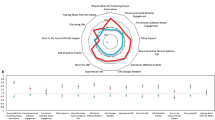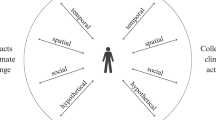Abstract
The collective action that is required to mitigate and adapt to climate change is extremely difficult to achieve, largely due to socio-ideological biases that perpetuate polarization over climate change1,2. Because climate change perceptions in children seem less susceptible to the influence of worldview or political context3, it may be possible for them to inspire adults towards higher levels of climate concern, and in turn, collective action4. Child-to-parent intergenerational learning—that is, the transfer of knowledge, attitudes or behaviours from children to parents5—may be a promising pathway to overcoming socio-ideological barriers to climate concern5. Here we present an experimental evaluation of an educational intervention designed to build climate change concern among parents indirectly through their middle school-aged children in North Carolina, USA. Parents of children in the treatment group expressed higher levels of climate change concern than parents in the control group. The effects were strongest among male parents and conservative parents, who, consistent with previous research1, displayed the lowest levels of climate concern before the intervention. Daughters appeared to be especially effective in influencing parents. Our results suggest that intergenerational learning may overcome barriers to building climate concern.
This is a preview of subscription content, access via your institution
Access options
Access Nature and 54 other Nature Portfolio journals
Get Nature+, our best-value online-access subscription
$29.99 / 30 days
cancel any time
Subscribe to this journal
Receive 12 print issues and online access
$209.00 per year
only $17.42 per issue
Buy this article
- Purchase on Springer Link
- Instant access to full article PDF
Prices may be subject to local taxes which are calculated during checkout



Similar content being viewed by others
Data availability
The datasets generated and analysed during the current study are available from the corresponding author on reasonable request.
References
McCright, A. M. & Dunlap, R. E. The politicization of climate change and polarization in the American public’s view of global warming, 2001–2010. Sociol. Q. 52, 155–194 (2011).
Kahan, D. M. et al. The polarizing impact of science literacy and numeracy on perceived climate change risks. Nat. Clim. Change 2, 732–735 (2012).
Stevenson, K. T., Peterson, M. N., Bondell, H. D., Moore, S. E. & Carrier, S. J. Overcoming skepticism with education: interacting influences of worldview and climate change knowledge on perceived climate change risk among adolescents. Climatic Change 126, 293–304 (2014).
Hornsey, M. J., Harris, E. A., Bain, P. G. & Fielding, K. S. Meta-analyses of the determinants and outcomes of belief in climate change. Nat. Clim. Change 6, 622–626 (2016).
Lawson, D. F. et al. Intergenerational learning: are children key in spurring climate action? Glob. Environ. Change 53, 204–208 (2018).
IPCC. Summary for Policymakers. In Global Warming of 1.5 o C (eds Masson-Delmotte, V. et al.) (Cambridge Univ. Press, 2018).
Leiserowitz, A. et al. Climate Change in the American Mind: March 2018. Yale Program on Climate Change Communication (Yale Univ. and George Mason Univ., 2018).
Wike, R. What the world thinks about climate change in 7 charts. Pew Research Center https://www.pewresearch.org/fact-tank/2016/04/18/what-the-world-thinks-about-climate-change-in-7-charts/ (2016).
Cook, J. et al. Quantifying the consensus on anthropogenic global warming in the scientific literature. Environ. Res. Lett. 8, 1–7 (2013).
Marquart-Pyatt, S. T., McCright, A. M., Dietz, T. & Dunlap, R. E. Politics eclipses climate extremes for climate change perceptions. Glob. Environ. Change 29, 246–257 (2014).
Hamilton, L. C. Education, politics and opinions about climate change evidence for interaction effects. Climatic Change 104, 231–242 (2011).
Moser, S. C. & Dilling, L. Creating a Climate for Change: Communicating Climate Change and Facilitating Social Change. (Cambridge Univ. Press:, 2007).
McCright, A. M. & Dunlap, R. E. Cool dudes: the denial of climate change among conservative white males in the United States. Glob. Environ. Change 21, 1163–1172 (2011).
Nisbet, M. C. Communicating climate change: why frames matter for public engagement. Environ. Sci. Policy Sustain. Dev. 51, 12–23 (2009).
Wardekker, J. A., Petersen, A. C. & van der Sluijs, J. P. Ethics and public perception of climate change: exploring the Christian voices in the US public debate. Global Environ. Change 19, 512–521 (2009).
Flora, J. et al. Evaluation of a national high school entertainment education program: the Alliance for Climate Education. Climatic Change 127, 419–434 (2014).
Stevenson, K. T., Peterson, M. N. & Bondell, H. D. Development of a causal model for adolescent climate change behavior. Climatic Change 151, 589–603 (2018).
LaSala, M. C. Lesbians, gay men, and their parents: family therapy for the coming-out crisis. Fam. Process 39, 67–81 (2000).
Mason, L. & Scirica, F. Prediction of students’ argumentation skills about controversial topics by epistemological understanding. Learn. Instruct. 16, 492–509 (2006).
Vollerberg, W. A. M., Iedema, J. & Raaijmakers, Q. A. W. Intergenerational transmission and the formation of cultural orientations in adolescence and young adulthood. J. Marriage Fam. 63, 1185–1198 (2001).
Boudet, H. et al. Effects of a behaviour change intervention for Girl Scouts on child and parent energy-saving behaviours. Nat. Energy 1, 16091 (2016).
Williams, S., McLean, L. & Quinn, N. As the climate changes: intergenerational action-based learning in relation to flood education. J. Environ. Educ. 48, 154–171 (2017).
Monroe, M. C., Plate, R. R., Oxarart, A., Bowers, A. & Chaves, W. A. Identifying effective climate change education strategies: a systematic review of the research. Environ. Educ. Res. https://doi.org/10.1080/13504622.2017.1360842 (2017).
Kerr, M., Stattin, H. & Trost, K. To know you is to trust you: parents’ trust is rooted in child disclosure of information. J. Adolesc. 22, 737–752 (1999).
Sausser, L. Former S.C. GOP Congressman Bob Inglis finds new focus in climate change, criticizing Trump. The Post and Courier (7 January 2018); https://www.postandcourier.com/news/former-s-c-gop-congressman-bob-inglis-finds-new-focus/article_a25f3aba-dea5-11e7-bf96-37fdc3b1c863.html
Jensen, F. E. & Nutt, A. E. The Teenage Brain: A Neuroscientist’s Survival Guide to Raising Adolescents and Young Adults. (Harper Collins:, 2015).
Archer, L. et al. Science aspirations, capital, and family habitus: How families shape children’s engagement and identification with science. Am. Educ. Res. J. 49, 881–908 (2012).
Duvall, J. & Zint, M. A review of research on the effectiveness of environmental education in promoting intergenerational learning. J. Environ. Educ. 38, 37–41 (2007).
Riggs, S. R, Ames, D. V, Culver, S. J. & Mallinson, D. J. The Battle for North Carolina’s Coast: Evolutionary History, Present Crisis & Vision for the Future. (Univ. North Carolina Press:, 2011).
Ericson, J. E. & Gonzalez, E. J. Hierarchical sampling of multiple strata: An innovative technique in exposure characterization. Environ. Res. 92, 221–231 (2003).
Creswell, J. W. & Creswell, J. D. Research Design: Qualitative, Quantitative and Mixed Methods Approaches. 5th edn, ((Sage Publishing:, 2018).
Darling-Hammond, L. & Richardson, N. Teacher Learning: What matters? Educ. Leadersh. 66, 46–53 (2009).
Leiserowitz, A, Smith, N. & Marlon, J. American Teens’ Knowledge of Climate Change. (Yale Project on Climate Change Communication:, Yale Univ., 2011).
Theobald, R. & Freeman, S. Is it the intervention or the students? Using linear regression to control for student characteristics in undergraduate STEM education research. CBE Life Sci. Educ. 13, 41–48 (2014).
No Child Left Behind (NCLB) Act of 2001, Pub. L. No. 107-110, 115 Stat 1425 (2002); https://www.congress.gov/bill/107th-congress/house-bill/1.
Acknowledgements
The authors acknowledge North Carolina Sea Grant supported by the NOAA office of Sea Grant, United States Department of Commerce, under grant No. 2016-R/16-ELWD-1, for funding for this research. The authors also acknowledge The Department of Interior Southeast Climate Adaptation Science Center for funding for this research through a graduate fellowship awarded to D.F.L. Finally, the authors acknowledge J. Hartley for creating Supplementary Fig. 1.
Author information
Authors and Affiliations
Contributions
The ideas for this paper were conceived by D.F.L., K.T.S. and M.N.P. Data analysis was performed by D.F.L., K.T.S. and M.N.P. All authors contributed to the writing and editing of the paper.
Corresponding author
Additional information
Journal peer review information: Nature Climate Change thanks Hilary Boudet, Matthew Motta and the other anonymous reviewer(s) for their contribution to the peer review of this work.
Publisher’s note: Springer Nature remains neutral with regard to jurisdictional claims in published maps and institutional affiliations.
Supplementary information
Supplementary Information
Supplementary Notes 1 and 2, Supplementary Figures 1 and 2, Supplementary Tables 1–7 and Supplementary References.
Rights and permissions
About this article
Cite this article
Lawson, D.F., Stevenson, K.T., Peterson, M.N. et al. Children can foster climate change concern among their parents. Nat. Clim. Chang. 9, 458–462 (2019). https://doi.org/10.1038/s41558-019-0463-3
Received:
Accepted:
Published:
Issue Date:
DOI: https://doi.org/10.1038/s41558-019-0463-3
This article is cited by
-
Education outcomes in the era of global climate change
Nature Climate Change (2024)
-
Refining relational climate conversations to promote collective action
npj Climate Action (2024)
-
The intergenerational learning effects of a home study program for elementary and junior high school children on knowledge and awareness of plastic consumption
Journal of Material Cycles and Waste Management (2024)
-
Towards authentic purposes for student science writing using culturally relevant pedagogy
Cultural Studies of Science Education (2024)
-
Climate change-related health hazards in daycare centers in Munich, Germany: risk perception and adaptation measures
Regional Environmental Change (2023)



